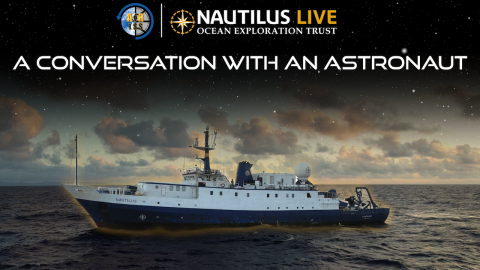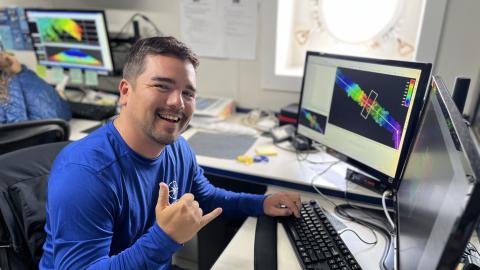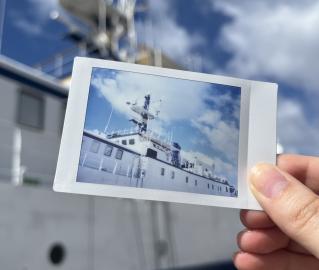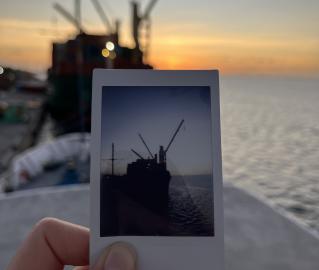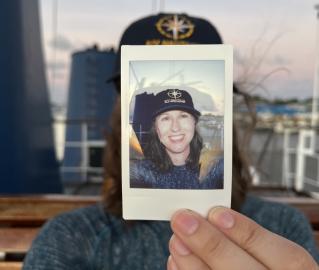Meet Ocean Explorer Lexie DelViscio
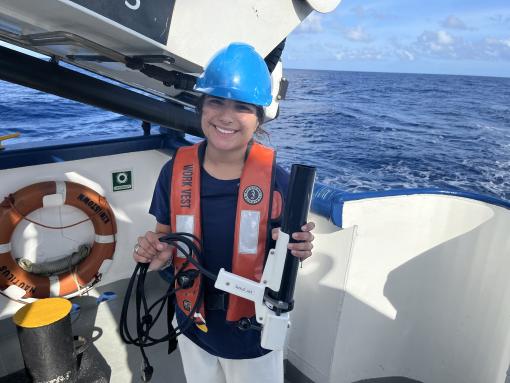
OET proudly welcomes Lexie DelViscio to the Corps of Exploration as part of the Science & Engineering Internship Program. This internship program supports community college, undergraduate, and graduate students in building professional workforce experience and exploring STEAM-related careers that connect to research themes like robotics, ocean science, education, and exploration. Lexie joins E/V Nautilus for our NA175 expedition as a Seafloor Mapping intern.
We sat with Lexie to learn more about her experience at sea and the path that led her to Nautilus.
Describe your role with OET.
I am a seafloor mapping intern on the NA175 expedition. During my watch (which is from 4am - 12pm), I split my time between monitoring the systems acquiring multibeam/sub bottom data and cleaning the multibeam data we are collecting. By cleaning the data as it comes in, this allows us to create real-time preliminary products to send back to shore and share with the public during ship-to-shore and science party live interactions.
Can you tell us a little about your background? What influenced you as a child?
I grew up in Annapolis, MD right next to the Chesapeake Bay, and I spent my summer vacations on the coast of Maine and the upper quarter of Cape Cod, MA. My earliest memories are of clambering through tide pools in Kennebunkport, ME. I wanted to learn anything and everything I could about the creatures in them. My mom instilled in me a great love for the ocean at a very young age. While we would bob through the waves when I was too young to swim, she would say to me “If you respect the ocean, the ocean will respect you”, this is a sentiment I have carried into the beginning of my career.
When you were a kid, what did you want to be when you grew up?
At first, I wanted to be a science teacher. I realized pretty quickly that teaching probably wasn’t the route I wanted to take. After that, I was split between photojournalism and marine biology. By the time I made it to high school, it was very apparent that I wanted to spend the rest of my life studying the ocean! I completed my bachelor's in marine biology at the College of Charleston in May 2024 (with a minor in data science), and I am now pursuing my masters in Biological Oceanography at the University of Rhode Island, Graduate School of Oceanography.
What would you consider to be your greatest challenge entering this field?
While it is easy to default to the standard challenges of those breaking into the STEM field (~2 years of experience often required for entry level positions), I would say my biggest challenge has been navigating my love for pure marine biology and my emerging love of hydrography and seafloor mapping. I always pictured myself on a very prescribed path (undergrad to masters to PhD to postdoc etc.), however as I discovered my passion for ocean exploration, ship-time, and seafloor mapping I have been at a bit of a crossroads as to the future of my career in this field! I feel this is the best challenge I could have though :)
Do you have any advice for someone looking to follow a similar path?
Talk to anyone and everyone you can! Don’t take networking opportunities for granted. It may not seem like it, but Oceanography and Hydrography are very small worlds and the more connections you have, the more opportunities that will come your way. Additionally, explore all of your interests! You never know what you may become passionate about. Lastly, enjoy every second of learning, whether it be on your own time, through school, or through hands-on-experiences. We never stop gaining new knowledge and it is so important to find something you want to continue learning about.
What's next for your ocean studies and career?
Next up for me is returning to Narragansett, RI and URI-GSO to complete my masters. I am entering my second year within Dr. Andrew Davies lab where I utilize year-long environmental time-series collected from benthic landers. In conjunction with bathymetric data this information allows me to analyze the habitat and distribution of mesophotic and deep cold-water corals. Following my masters, I am not 100% sure yet, but I am leaning towards pursuing a ship-based position seafloor mapping! Thankfully, I have a little more time as a graduate student to make these decisions!!
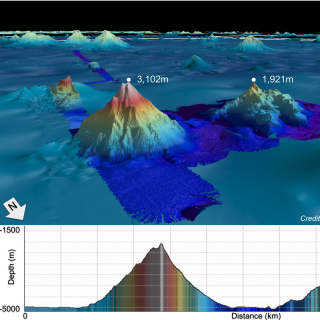
Seafloor Mapping Offshore Howland & Baker Islands
During this expedition, E/V Nautilus explores the waters offshore Howland & Baker Islands. Located roughly midway between Hawaiʻi and New Zealand in the Central Pacific Ocean, the islands of Howland and Baker are some of the most isolated land masses on Earth.
